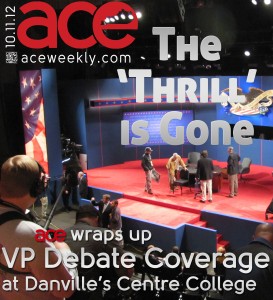[one_third]
The ‘Thrill’ is Gone
By Patrick O’Dowd

The “Thrill in the ‘Ville II” has come and gone. Now, a few hours removed from the turbulence of Spin Alley, it’s safe to say three things: 1) Danville and Kentucky shined last night, pulling of the event spectacularly; 2) Both Biden and Ryan did exactly what they need to do for their teams last night; 3) Martha Raddatz deserves to have her name shouted from the rooftops.
This year’s one and only Vice Presidential Debate at Centre College was a wonderfully executed showcase for the state. Driving from Lexington to Danville, the state’s trees were just on the cusp of turning and the ivy vines that covered the rock faces through which the highways cut already glowed red. Danville itself, was picturesque. The yards of most every home in town were peppered with political signs covering the spectrum of possible elected offices. Centre College had everything well organized and while security and road closures were a hassle, they were not disruptive, and those wandering around the city waiting for the main event seemed to have little trouble enjoying themselves. Simply put: it was nice to see Kentucky have a moment in the spotlight beyond the usual Derby and basketball spectacles.
I can’t say I really know how the debate played out in the living rooms and iPad screens across America but sitting in the media filing room, one building over from the debate hall, there seemed to be no lack of political excitement amongst the roaming hordes of campaign journalists. The “Thrill in the ‘Ville II” lived up to expectations as Biden and Ryan swung enthusiastically at each other. From the start, Biden came out like this was the last fight of his life. Leaning forward, gesticulating madly, responding to everyone of Ryan’s criticisms or Raddatz’s questions (more on that soon), Biden showed up. Which is more than could be said of his boss at the last Presidential debate. Ryan was more subdued, reserved, but he also did his job. He stuck to the talking points and was able to come across as the adorable wonk that the GOP needs him to be.
Martha Raddatz. What more needs to be said. After Lehrer’s rather dismal debate moderating in Denver, Raddatz’s aggressive style was invigorating. From the opening question on Libya and the death of Ambassador Stevens, to pointedly insisting on specifics when the candidates responded with platitudes, she ran the show. Ryan, Biden, and their campaigns should be thankful for her assertive stance and tough questions. Her performance bettered both of theirs by keeping them on track and focused; the candidates seemed to find energy in their answers from the energy that she brought to asking the questions and guiding the debate.
No minds were changed last night, but it was an important night for both campaigns. Biden managed to stop the bleeding among liberals after the downright dull Obama performance. Ryan helped prove his foreign policy chops by not saying anything the campaign will have to spend the next week undoing. Both sides will use this next week to play up Biden’s seemingly uncontrollable laughter or Ryan’s lack of substantive details on issues at home and abroad (details he often had before being folded into the Romney campaign). Yet, it is very unlikely this will change the fundamental dynamics of the race. Despite a few polls this week suggesting otherwise, Obama is up a few points nationally and has a few crucial swing states currently going his way. Romney is close — very close — and can smell blood. If he can turn one of Obama’s swing states and claim Ohio, the election could well go his way.
Either way, this was likely the last time you’ll see Kentucky make any news in this election so let’s just pretend the reason Biden was smiling so much is because we Kentuckians are just that great.
[/one_third]
[one_third]
The Debate for No. 2 Becomes Topic No. 1
By Kakie Urch
Who knew, when Centre College contracted to host its second debate for the second spot on the ticket that the night would be so important and create such public political conversation and participation?
Not me, even up until last week when I watched, live on BBC at 4 a.m., from under the covers in my hotel room in Lusaka, Zambia, President Barack Obama resoundingly lose the University of Denver debate against Mitt Romney. I announced to my African colleagues the next morning, “Well, the president lost.” My American colleague said, “Well, what can that matter? Unless it was just awful, like Nixon against Kennedy?” I said “It was that bad.”
And so Centre stepped into the spotlight, with two contenders from the undercard to fight for the world championship.
The result was, in many ways, the type of politics we often say we wish for: civil, issue-oriented, engaging, infused with specifics and creating public participation and discussion. Martha Raddatz was brilliant, polished, strong and professional. She took no fluff.
Centre College was a diamond. I heard an IFB pre-positioned John Thune (in private conversation) tell Senator Mitch McConnell “This college is wonderful.” McConnell responded. “Yes, it’s a treasure. It’s been here forever.” The execution and logistics of the event, the media processing, public information help, facilities and security were among the best I have experienced in my life, and all the way infused with that Southern, something extra, the kindness no one else would have thought of.
The event created unprecedented public participation, as social media, especially Twitter, allowed 500 million extra people in the Spin Room. Instant polling by CBS said that of undecided voters, 50% thought that Joe Biden won with about 30% saying that Paul Ryan won and 13% said it was a tie.
Some of the symptomatic things that struck me about this debate have not yet congealed into a thumbs up or thumbs down. The fact that on the international Day of the Girl, neither candidate mentioned a woman who was not his wife, mother or bean-shaped daughter-to-be was troubling. Well, actually Paul Ryan won that one — he mentioned Sec. of State Hillary Clinton as a source for one of the memorized talking points. Thank goodness Martha Raddatz and Debate Commission Chairwoman Janet Brown were on the stage as simple examples of female excellence.
But missing from the conversation, despite the Catholic-faith infused discussion of abortion philosophy (not abortion policy), were many of the issues that matter most to women: Education and Economic Development (because women know that a tax cut here and a tax cut there is not economic development — business is about much more than whether the math works).
Missing in the Spin Room were any “Blue” standards. There were seven people spinning for the Democrats and more than 22 spinning for the Republicans.
Missing on National Coming Out Day was the issue of LBGT civil rights and marriage equality. Missing in the mix of an evening that will help determine whether America will re-elect its first black president to a second term, were black people. Over the course of two days at Centre College, I saw fewer black people in the audience, the Spin Room, or the press corps than I saw white people at the Arcades marketplace the previous Sunday in Africa. Over two days, I heard no one speaking Spanish, which numerically speaking, these days, is downright unAmerican.
Missing were the poor. Our Ace VP Bingo squares of “Entitlements.” ” Unemployment” and “Immigration” went largely unpunched as time after time the ball landed on “Iran/Libya” and “Cronyism.” However, Centre College had a quiet and immensely powerful answer for that ( The Candidates’ Calculated Silence on the Poor, by Centre religion professor Rick Axtell.)
One could teach a whole class from the transcript of the debate, just unpacking the history and ideology behind the fast-paced conversation about foreign policy and domestic programs….Chapter 7 “Oh Now You’re Jack Kennedy!” And maybe Centre College should do just that.
[/one_third]
[one_third_last]
Post Debate
By Raj Ranade
One thing that’s worth noting about Spin Alley is that in addition to all the figurative perception-bending, there’s a certain amount of literal spinning that’s happening, or at least a vague kind of churning circular motion. What you see on TV is the border of the spin room – demarcated little booths decked out with LED lighting grids and cameras pointing towards the center of the room, in front of which your pundits declare the winners and the losers of the day. The most interesting part of the room, however, is the chaotic

swirl of people at its center, where student volunteers hold vertical signs like medieval standard bearers, announcing the presence of various campaign staffers and congressmen (in attendance today were Rand Paul, Mitch McConnell, David Axelrod, Jim Messina, Dick Durbin, John Thune, Jason Chaffetz, and many others – the party split broke down to a lopsided 22 Republicans to 7 Democrats, for whatever reason). The journalists then bounce around the room shoving tape-recorders in front of faces to grab a few quotes before bouncing away to their next subject.
The most high-profile types (Axelrod and the hometown senator Paul in this case) unsurprisingly don’t have much trouble attracting microphones their way, but the handlers for junior Congressmen have to work a little harder, chiefly by seizing on the more aimless reporters who may be milling about the crowd (read: me). This sometimes takes on the tone of a Hollywood agent parading around a fresh ingenue (“Have you heard about Congressman [Aaron] Schock? He was just recently on the cover of Men’s Health!”). It’s also interesting to see that the party talking points seem to calcify even before the debate itself is actually over.
It’s not just that the representatives of each party seem convinced that their guy was the clear winner of the debate – it’s that you hear eerily precise quotations bouncing around the room. “Our guy held Paul Ryan to account for his lies to the American people,” with an emphasis on the colloquial phrasing of “our guy,” was one liberal refrain. “Why is Biden laughing at the Iranian nuclear threat?” went one conservative counterpart centering on the vice-president’s, let’s say, jovial demeanor.
For the most part, the journalists here are more interested in recording statements than in challenging political platitudes – in part because the chaos of the environment makes it hard to press someone for an answer, since they can slip away easily (rhetorically or physically). And once you get over the surreal effect of being in a crowd where you are quite literally bumping into Congressmen as you attempt to navigate the room, it’s that element that makes the whole thing seem like a carefully cultivated waltz – a dance between partners with strict, carefully defined rules of interaction, where everyone seems particularly desperate to not be the pretty girl standing alone in the corner.
[/one_third_last]
Ace Vice Presidential Debate Coverage at Centre College was produced by crew chief and Ace Contributing Editor Kakie Urch, with Ace contributors Raj Ranade and Patrick O’Dowd, and Centre student Alex Gardner. Production and Design: Chris Snider, Mic Hardman, Meagan McKee, Matt Sparks.
ALSO IN THIS ISSUE
The 2012 Vice Presidential Debate on Saturday Night Live
30 Rock Takes on Vice Presidential Politics, again
A Centre Student Attends the VP Debate, Shares Perspective
Call to the Post Your Stories, Fellas. Kentucky hosts VP Debate (Video)
The PreShow: Ben Sollee plays the Debate Festival; downtown shows off “character”
Spin Alley readies for the Battle Before the Battle
Centre Students win the Lottery, snag tickets to Centre Vice Presidential Debate
Cheers from the Governor’s Kentucky Bourbon Reception: A Drinking Game and a Very Special Ace Recipe











